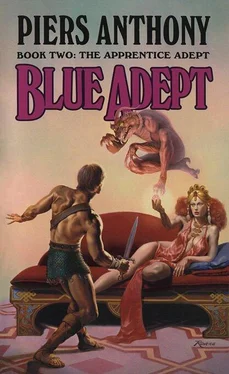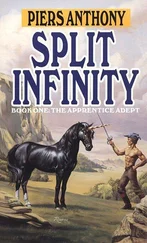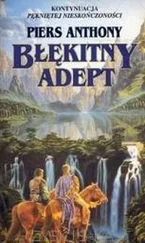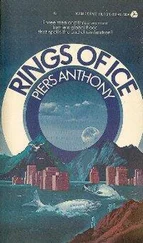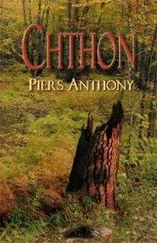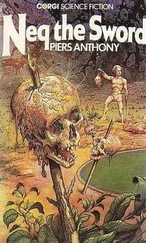Piers Anthony - Blue Adept
Здесь есть возможность читать онлайн «Piers Anthony - Blue Adept» весь текст электронной книги совершенно бесплатно (целиком полную версию без сокращений). В некоторых случаях можно слушать аудио, скачать через торрент в формате fb2 и присутствует краткое содержание. Год выпуска: 1981, ISBN: 1981, Издательство: Del Rey, Жанр: Старинная литература, на английском языке. Описание произведения, (предисловие) а так же отзывы посетителей доступны на портале библиотеки ЛибКат.
- Название:Blue Adept
- Автор:
- Издательство:Del Rey
- Жанр:
- Год:1981
- ISBN:9780808586548
- Рейтинг книги:3 / 5. Голосов: 1
-
Избранное:Добавить в избранное
- Отзывы:
-
Ваша оценка:
- 60
- 1
- 2
- 3
- 4
- 5
Blue Adept: краткое содержание, описание и аннотация
Предлагаем к чтению аннотацию, описание, краткое содержание или предисловие (зависит от того, что написал сам автор книги «Blue Adept»). Если вы не нашли необходимую информацию о книге — напишите в комментариях, мы постараемся отыскать её.
Blue Adept — читать онлайн бесплатно полную книгу (весь текст) целиком
Ниже представлен текст книги, разбитый по страницам. Система сохранения места последней прочитанной страницы, позволяет с удобством читать онлайн бесплатно книгу «Blue Adept», без необходимости каждый раз заново искать на чём Вы остановились. Поставьте закладку, и сможете в любой момент перейти на страницу, на которой закончили чтение.
Интервал:
Закладка:
Clef finished. The audience applauded politely. It had been an excellent performance, without question; the tiny and subtle nuances of feeling were not something the aver-age person grasped consciously. People seldom knew why they liked what they liked; they only knew that in this instance something had been lacking.
Now it was Stile’s turn. Clef lowered his instrument and stood silently, as Stile had. The music screen lit before Stile with the printed music. Actually, Stile did not need it; he could reproduce it from his memory of Clef’s performance. But he looked at it anyway, because he did not want to make any single false note. Nothing that would jar the audience out of its rapport.
Stile played. From the start, his hands moved well. The Stile had had from the time he discovered it, there in the great valley between the Purple Mountains and the White Mountains in the lovely frame of Phaze. He thought of Neysa as he played, and it was as if he were playing for her, with her again, loving it. Every note was true; he knew he would make no errors.
But he was not playing for himself or for Neysa now. He was performing for an audience. Stile refocused on that, passing his gaze over the people, meeting eyes, leaning forward. He tapped his bare heel, not to keep the beat for himself but to show the audience. A toe could tap unobtrusively, but a heel made the entire leg move; it was obvious. The people started picking it up, their own legs moving. Stile caught the eye of a young woman, and played a brief passage seemingly for her alone, then went on to another person, bringing each one in to him. It was a responsive audience. Soon most of the people were swaying to the music, nodding their heads, tapping their heels. He was working them up, making them part of his act, giving them the thrill of participation. Together, they all played the harmonica.
Suddenly it ended. The piece was over. Had it been enough?
The moment Stile put down his instrument, the audience burst into enthusiastic applause. Stile glanced at Clef —and found the man staring, his lips parted. Clef, it seemed, had not realized that music could be played this way, that it could be hurled out into the audience like a boomerang, and bring that audience back into its ambience. Perhaps Clef considered this a degradation of the form. No matter; Stile had won his audience.
Sure enough, the announcement verified the split decision. “Expertise, first player. Clef. Social content, second player, Stile. Draw.” For the benefit of the audience, the Computer was not employing the assigned Player numbers now.
Clef shook his head ruefully. “You showed me something, Stile. You played very well.”
Stile’s reply was forestalled by another announcement by the computer. “It is an option of the Game Computer to require a continuation of a drawn match in the Tourney.
This option is now exercised. The contestants will perform a medley in duet, the parts alternating as marked on the score. A panel of qualified musicians will be the final arbiter.”
Oh, no! Stile had thought himself safe. A new trap had suddenly closed on him. But there was nothing to do except play it out, despite a judgment that would surely be unfavorable to him. He would not be able to evoke the confused passions of an audience of experts. There was an intermission while the panel was assembled. “This is new to me,” Clef said. “Is there a precedent?”
“I’ve heard of it,” Stile said. “But normally it is invoked only when the contestants can’t agree on the draw and insist on playing it out.”
“Is it fair? I hardly object to finishing this in Music, but it seems to me you should prefer—I mean, a panel of musicians—“
“Is likely to favor the musician,” Stile agreed. “I might win the audience again, but not the computer or the panel. You’re bound to take it.”
“You must lodge a protest!”
“No good,” Stile said. “The Computer does have the option. I’m stuck for it. I knew the rules when I entered the Tourney.” And this was very likely the end of his participation in it. So close to the key Round, secured by that prize of tenure!
“I don’t like this at all,” Clef said. “I do want to win, and I’ll have to play my best, but there is a fundamental inequity here on more than one level. It is not merely that the odds of your winning are greatly in your favor if we go to a new grid. It is that you have a chance to go consider-ably farther in the Tourney than I do; you are a skilled player, while my skills are largely limited to this particular pursuit. You should be allowed to continue, for I shall surely be eliminated in the next Round or two.”
“Play your best,” Stile said. “Chance is always a factor in the Game. Someone always profits, someone always loses. I do have another resource.” Stile knew he faced disaster, but his liking for this honest man increased. How much better it was to lose to superior talent than to blind chance!
“While we wait—would you be so kind as to explain to me how you make the audience respond like that? I saw it, but I have never been able to do that. I rather envy it.”
Stile shrugged. “It’s apart from the music itself, yet also the essence of it. Basically you have to achieve rapport with the people you’re performing for. You have to feel.”
“But that isn’t music!” Clef protested.
“That is the vital spirit of music,” Stile insisted. “Sonic emotion. The transmission of mood and feeling from one person to another. The instrument is merely the means. The notes are merely means. Music itself is only a process, not the end.”
“I don’t know. This is like heresy, to me. I love music, pure music. Most people and most institutions fall short of the ideal; they are imperfect. Music is the ideal.”
“You can’t separate them,” Stile said, finding this exploration interesting. “You are thinking of music as pearls, and the audience as swine, but in truth pearls are the accretions of the irritation of a clam, while the audience is mankind. These things must go together to have meaning. Like man and woman, there’s so much lost when apart...”
“Like man and woman,” Clef echoed. “That too, I have never quite understood.”
“It’s not easy,” Stile said, thinking of the Lady Blue and her violent shifts of attitude during their last encounter.
“But until—“
He was interrupted by the Game Computer. “The panel has been assembled. Proceed.” Musical scores appeared before Clef and Stile. The sound of a metronome gave them the countdown. Quickly each lifted his harmonica to his mouth.
It was an intricate medley, highly varied, with segments of popular, folk and classical music from Planet Earth. The two ranges counterpointed each other nicely. The audience listened raptly. The music of a single instrument could be excellent, but the action of two instruments in harmony was qualitatively as well as quantitatively superior.
Stile found that he liked this composite piece. He was playing well—even better than before. Partly it was the inherent joy of the counterpoint, always a pleasure; that was why he and Neysa had played together so often. But more, it was Clef; the musician played so well that Stile needed to make no allowances. He could depend on Clef, lean on him, knowing there would be no error, no weakness. Stile could do his utmost. Everything was keyed correctly for takeoff.
Stile took off. He played his part with feeling, absorbing the rapture of that perfect harmony. He saw the audience reacting, knowing the technique was working. He put just a little syncopation in it, adding to the verve of the presentation. The Computer would scale him down for that, of course; it could not comprehend any slightest deviation from the score. To hell with that; Stile was lost anyway. He could not exceed his opponent’s perfection of conformance, and had to go for his best mode. He had to go down in the style he preferred. He refused to be bound by the limitations of machine interpretation. He had to feel. And—he was doing that well.
Читать дальшеИнтервал:
Закладка:
Похожие книги на «Blue Adept»
Представляем Вашему вниманию похожие книги на «Blue Adept» списком для выбора. Мы отобрали схожую по названию и смыслу литературу в надежде предоставить читателям больше вариантов отыскать новые, интересные, ещё непрочитанные произведения.
Обсуждение, отзывы о книге «Blue Adept» и просто собственные мнения читателей. Оставьте ваши комментарии, напишите, что Вы думаете о произведении, его смысле или главных героях. Укажите что конкретно понравилось, а что нет, и почему Вы так считаете.
